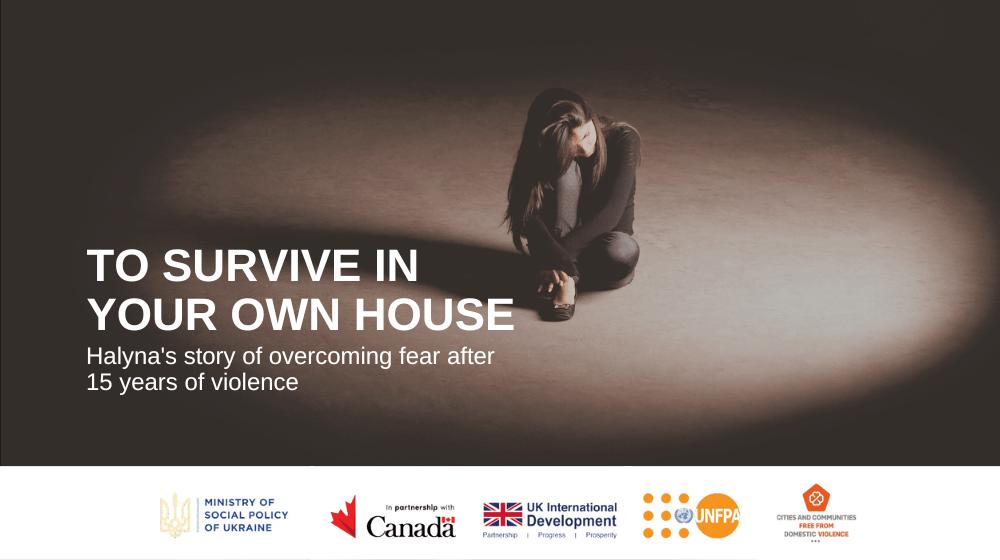"I no longer want to hide" — these words capture the essence of Halyna's story. A woman from Ternopil endured 15 years of relentless abuse and mistreatment from her husband, Bohdan. In her youth, Halyna longed for warmth and family happiness but instead faced years of pain, fear, and despair. She managed to overcome it all, holding onto a glimmer of hope for a different life.
Halyna was born with cerebral palsy, but despite her condition, she was confident from a young age. Thanks to her parents' support, she never viewed her disability as a limitation; instead, she had ambitions, goals, and a strong belief in herself. This is why Halyna imagined having by her side someone equally resilient — someone who, at first glance, seemed to be Bohdan.
The two met by chance at a mutual friend’s gathering. Bohdan immediately took the initiative, offering to walk Halyna home. Their relationship quickly developed, largely due to Bohdan's persistence. Just three months after meeting, they were married.
“He was there for me, helped, and protected me. When I twisted my ankle, he carried me in his arms. And when his parents didn't accept me, calling me crippled, he stood up for me. What can I say — before the wedding, he would not even dare to raise his voice at me. But it all revealed itself to be a facade,” Halyna said.
At the time, she truly believed she was marrying a reliable and caring man. But the masks fell away just days after the wedding: Bohdan began disappearing at night after work, turning off his phone, and returning at dawn, often drunk.
“He insisted he was with friends. But after one such incident, I just put his belongings outside the door. He went to stay with his parents for a week, but when his mother threw him out, he returned, begging for forgiveness, kneeling, and promising to change. I believed him, thinking everyone deserves a chance to make a mistake,” the survivor says.
While they lived with Halyna’s parents, Bohdan controlled his behavior. The young couple was renovating an apartment and preparing to move in together. But only a few months into the marriage, Halyna experienced her first incident of physical violence — on Christmas Eve. While she and her mother were cooking in the kitchen, Bohdan went to the apartment and, instead of working on the repairs as promised, was drinking alone.
“When I went to check on him and saw what he was doing, I started to argue with him. He hit me in the head. I fought back and told him I wanted a divorce. But once again, he convinced me it would never happen again,” she said.
After that, similar incidents repeated again and again — first when he was drunk, and later even when he was sober. Once the couple finally moved into their apartment, the fights and violence became routine: bruises, glasses were smashed over her head, and police calls, followed by yet more apologies and promises to change. During brief periods of reconciliation, Bohdan would bring Halyna flowers, go out with her to visit mutual friends and appear to be a reasonable partner. However, behind the closed doors of their apartment, the reality was very different.
As Halyna said, contacting law enforcement changed nothing in that time. After brief detentions, Bohdan was always released and would return home. Evicting him herself, she says, was out of the question.
According to Halyna, Bohdan had no steady job. He occasionally worked at car washes or construction sites but never brought his earnings home.
“There was never a paycheck. He’d say he wasn’t paid or was underpaid, or would get paid later, or that he lost the money. In reality, he drank it all away. To support us, I worked two jobs. Then, in 2017, I quit and fully dedicated myself to volunteer work,” she says.
Halyna’s father helped Bohdan find stable work with a company installing heating systems. But with the new job, which required frequent trips, a new nightmare began: mistresses.
“I only suspected it back then; he wouldn’t admit it. We argued, he hit me, and then he would try to make me feel sorry for him by pressuring me on my most sensitive issue — children,” Halyna said. From the beginning of their marriage, the couple had struggled to conceive. Halyna initially thought the issue lay with her, but, after years of urging Bohdan to get tested, it turned out he was unable to have children.
“He was prescribed treatment, but he didn’t follow it and kept drinking. During arguments, he would always come back to promises and fantasies about having children and about starting treatment. But he stalled until the point where I entered menopause. That’s when I realized that ‘my train had left the station’,” Halyna says.
After Russia’s full-scale invasion in Ukraine, according to Halyna, living together became especially unbearable. The arguments happened daily and for no real reason. Bohdan would pick fights over household issues, over a single wrong word, or even just a look.
On top of this, she uncovered a long-standing affair he was having with a woman from another city, after overhearing their conversation and finding intimate photos in his phone. When Halyna confronted him with these nudes, he seemed to lose control.
“He slapped me, shoved me, and hit me in the head. I fell back against the door frame. I have a herniated disc, and the pain nearly made me black out. I called the police, who then called a psychosocial support mobile team for survivors of domestic violence and an ambulance,” Halyna recalls of one January evening this year.
She was hospitalized, and it was in the hospital that she began receiving psychological support. Bohdan tried to make amends, even promising to attend counseling with her. But she remained firm in her decision to divorce. When he realized this, he escalated to threats and intimidation.
“He yelled that he would blow me up, shoot me. One evening, there were five police cars and bomb disposal units outside my home. I was afraid to walk the streets; I’d take taxis because he could be waiting at the bus stop. He kept sending me threatening messages from different accounts. It gave me panic attacks,” Halyna recalls.
An even greater shock came when she learned of his intimate relationship with his niece, who was on the verge of adulthood. She says she managed to deal with the trauma and pain thanks to the specialists at the Daycare Center for Social and Psychological Assistance to Survivors of Gender-Based Violence. They referred Halyna to free legal aid, whose specialists defended her interests throughout the divorce. Career advisors also provided guidance as she searched for work. The center’s psychologist, she says, became her source of support, especially when job rejections kept piling up one.
“I thought I would never find work. I kept getting turned away because of my mobility issues. I felt like giving up... I told myself I wasn’t good enough, that I was somehow lesser. But the psychologist kept reminding me that I hadn’t found my true place yet. The center became a second home for me,” Halyna admits.
Gradually, her life is beginning to fall into place. She regained control, found a job as a saleswoman, and completed her probationary period. But most importantly, she has regained her confidence and shed her fear.
“I don’t want to hide anymore. To all women going through abuse, I want to say that no matter how hard or frightening it is, keep moving forward. I never thought I could overcome all of this, but thanks to God, the center, and the professionals, I am finally living in my apartment, earning a living, and can finally buy my mother a gift,” Halyna says, with her voice breaking with emotion.
The Daycare center`s work is made possible by the ‘Cities and Communities Free from Domestic Violence’ project. The project is being implemented in cooperation with the Ministry of Social Policy of Ukraine, with the support of the governments of Canada and the United Kingdom as part of the UNFPA program on preventing and counteracting gender-based violence.



